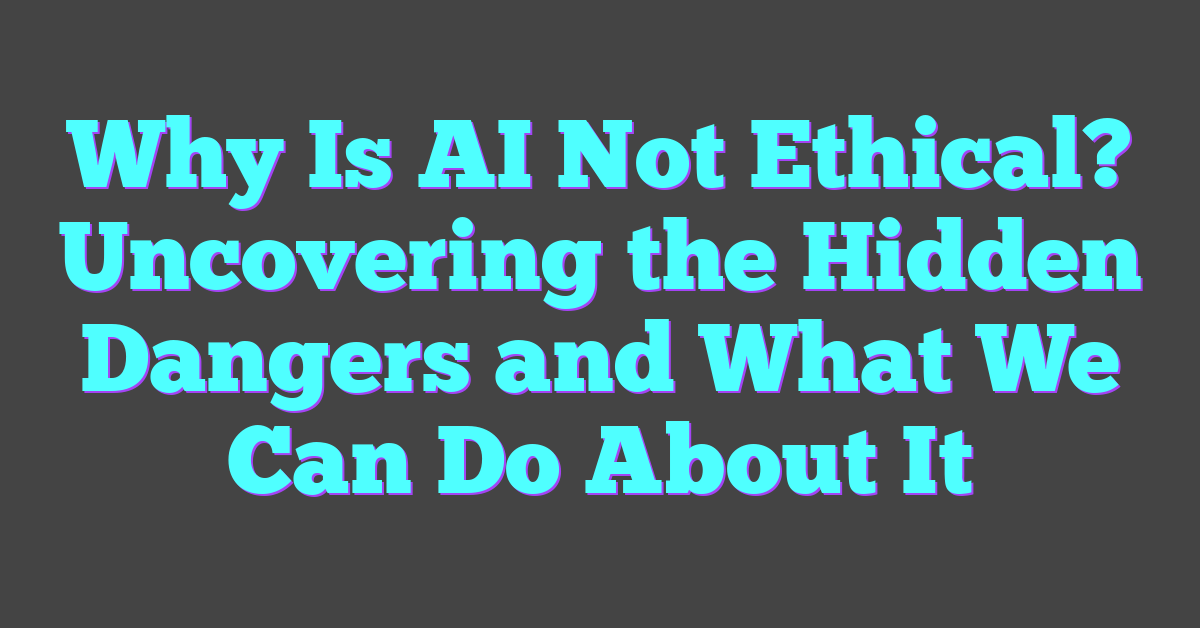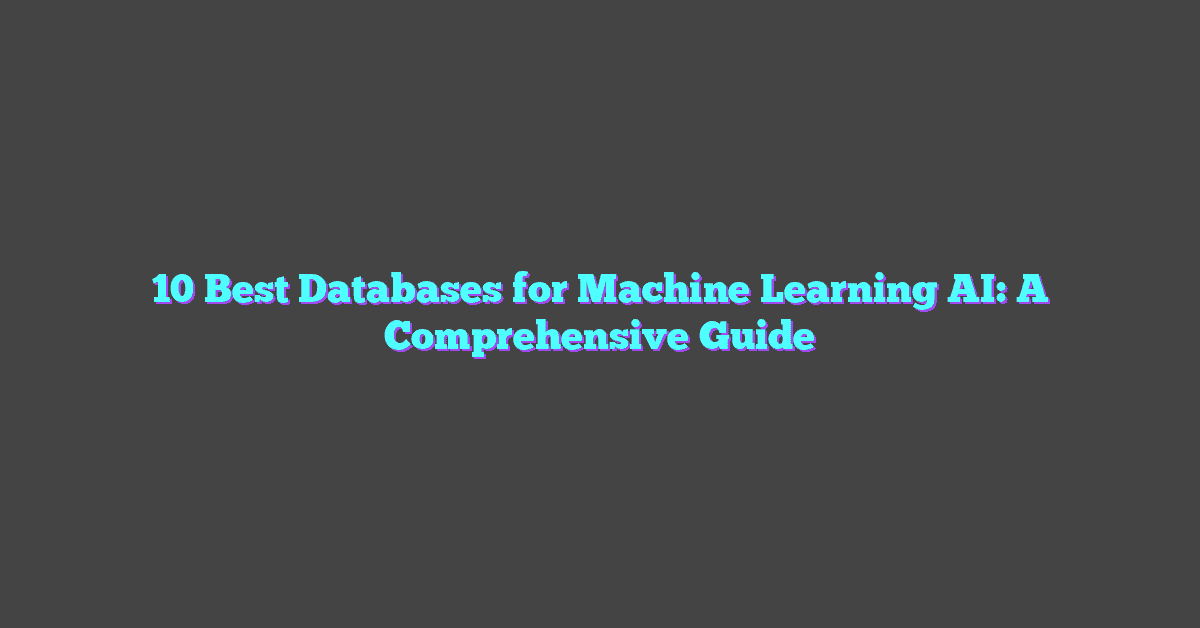Artificial Intelligence (AI) promises to revolutionize industries, but it’s not without ethical concerns. From biased algorithms to privacy invasion, AI’s rapid development raises questions about fairness and accountability. These technologies often reflect the prejudices of their creators, leading to unintended consequences.
Consider how AI systems can perpetuate discrimination in hiring or lending. When these systems rely on historical data, they may reinforce existing biases, making it harder for marginalized groups to get a fair chance. Moreover, the lack of transparency in AI decision-making processes leaves individuals without recourse when things go wrong.
Unpacking the Ethical Challenges of AI
Artificial Intelligence (AI) presents several ethical challenges that need addressing. This section dives into key issues like bias, discrimination, and lack of transparency.

Bias and Discrimination in AI Systems
AI systems often exhibit bias and discrimination. This occurs because AI algorithms learn from historical data, containing societal biases. For example, hiring algorithms may favor male candidates over female ones due to existing gender imbalances in the data. Similarly, facial recognition systems might perform poorly on darker skin tones if trained mainly on lighter-skinned images.
These biased outcomes reinforce existing inequalities, making it difficult for marginalized groups to receive fair treatment in key areas like employment, lending, and law enforcement. Addressing these biases involves rigorous auditing of AI models and including diverse data sets in training processes. Without these corrective measures, AI systems can unfairly disadvantage certain groups, perpetuating systemic discrimination.
Lack of Transparency and Explainability
Lack of transparency and explainability constitutes another major ethical concern in AI. AI models, especially deep learning ones, often function as “black boxes,” making decisions without clear, understandable reasoning. This opacity prevents users from understanding how decisions are made, leading to mistrust and potential misuse.
For instance, if a lending AI denies a loan application, the applicant should know the reasons behind this decision. However, black-box models often provide no such explanations, leaving applicants without recourse. Enhancing AI systems’ transparency means developing methods to interpret and explain AI decisions clearly. Tools like model-agnostic explainers and transparency frameworks can help make AI systems more accountable and user-friendly.
These ethical challenges highlight the pressing need for responsible AI development, ensuring fairness, transparency, and accountability in AI applications.
Legal and Privacy Concerns with Artificial Intelligence
Artificial Intelligence raises substantial legal and privacy concerns, especially as its applications penetrate more aspects of everyday life.
Surveillance and Data Privacy Issues
AI technologies have significantly increased surveillance capabilities. Algorithms can analyze vast amounts of data from various sources (e.g., public cameras, social media) to identify individuals and track their activities. This raises significant concerns about data privacy. Unauthorized data collection and the lack of user consent further exacerbate these issues. Regulators worldwide find it challenging to keep up with rapid AI advancements, leaving gaps in legal protections for privacy.
Accountability in AI Decision-Making
Accountability becomes problematic in AI applications because of their opaque decision-making processes. When AI systems make errors (e.g., wrongful arrests, biased hiring decisions), it’s often unclear who should be held responsible. This lack of clarity can result in a lack of recourse for individuals adversely affected. Ensuring accountability means implementing robust auditing mechanisms, clear guidelines on governance, and involving human oversight. Legislation and industry standards must evolve to specify liability in AI decision-making to safeguard public interest effectively.
The Impact of AI on Employment and Society
Artificial Intelligence (AI) has transformative potential but its implications raise significant ethical questions, particularly for employment and society.
Job Displacement Fears
AI’s integration into workplaces often leads to job displacement. Machines and algorithms handle tasks previously done by humans. Examples include customer service chatbots, automated manufacturing lines, and sophisticated data analysis tools. Oxford University’s study estimates that nearly 47% of US jobs could be automated in the next two decades, highlighting this concern. Workers in repetitive, routine jobs face higher risks of being replaced by AI technologies. As businesses seek efficiency and cost-saving measures, the shift toward automation accelerates.
Deepening Social Inequality
AI exacerbates social inequality through unequal access and application. Higher-income individuals and businesses can afford advanced AI technologies, gaining competitive advantages. For instance, large corporations utilizing AI can streamline operations, reduce costs, and enhance customer experiences, further widening the gap between themselves and smaller enterprises. Disparities also manifest in education and healthcare, where wealthy institutions adopt AI for advanced diagnostics and personalized learning, leaving less affluent entities behind. These dynamics contribute to a growing divide, intensifying existing socio-economic disparities.
By understanding these impacts, stakeholders, including policymakers, industry leaders, and communities, can develop strategies to mitigate adverse effects and promote equitable AI deployment.
Possible Solutions to Enhance AI Ethics
Addressing the ethical concerns surrounding AI is crucial for ensuring its beneficial and fair use. Experts suggest several measures to mitigate risks and enhance AI ethics.
Implementing Robust AI Governance
Governance frameworks can guide AI development towards ethical standards. Policies must outline clear responsibilities for AI creators and users, covering data management, decision processes, and accountability. By establishing international guidelines, stakeholders can standardize practices and ensure compliance.
Organizations should adopt ethical guidelines similar to Google’s AI principles, which prohibit harmful applications like surveillance without consent (source: Google AI). Ensuring audits by third-party entities helps maintain fairness and transparency in AI applications.
Promoting Fair and Transparent AI Practices
Implementing practices that promote fairness and transparency is essential for trustworthy AI. Developers should prioritize diverse data sets to minimize biases. For example, IBM’s AI Fairness 360 tool helps in detecting and mitigating biases in AI models (source: IBM Research).
Transparency also improves when AI decision-making processes are explainable. Integrating explainable AI techniques ensures that users understand how decisions are made, fostering trust. Open-source platforms, like TensorFlow, encourage collaboration and verification, contributing to more reliable and fair AI development.
By taking these proactive steps, AI can be harnessed responsibly, aligning with ethical standards and societal values.
Conclusion
AI’s ethical challenges are complex and multifaceted. From biased algorithms to privacy concerns and job displacement, these issues highlight the need for careful consideration and proactive measures. Emphasizing transparency, accountability, and diverse data sets can help mitigate some of these concerns. Moreover, robust governance frameworks and explainable AI techniques are crucial for fostering trust and ensuring AI aligns with ethical standards and societal values. As AI continues to evolve, it’s essential to prioritize ethical practices to harness its potential responsibly and equitably.
Frequently Asked Questions
What are the main ethical concerns related to Artificial Intelligence?
The main ethical concerns include biased algorithms, privacy invasion, and reflecting the biases of their creators. These issues can lead to discrimination and unequal treatment in various applications of AI.
How does AI perpetuate discrimination?
AI can perpetuate discrimination by learning from historical data that contains biases. If the data includes discriminatory patterns, the AI system may replicate and even exacerbate these biases in its outputs.
Why is transparency important in AI systems?
Transparency is crucial to ensure that AI decisions can be understood and scrutinized. It helps users and stakeholders trust the system and ensures that any biases or errors can be detected and corrected.
What is the role of auditing in AI?
Auditing helps in reviewing and assessing AI systems for fairness, accuracy, and adherence to ethical standards. It is a mechanism to ensure that AI technologies are functioning correctly and fairly.
How can diverse data sets improve AI ethics?
Diverse data sets help to mitigate biases by ensuring that the AI is trained on a wide range of examples, preventing it from becoming skewed towards any particular group or outcome.
What are the privacy concerns with AI?
AI technologies can enhance surveillance capabilities, raising concerns about data privacy. Personal data might be collected, processed, and used in ways that individuals haven’t consented to or aren’t aware of.
Why is human oversight necessary in AI decision-making?
Human oversight ensures accountability and ethical decision-making. It provides a check against the errors and biases that AI systems might introduce, thus protecting against unjust outcomes.
How does AI impact employment and society?
AI can lead to job displacement, as automated systems take over tasks previously performed by humans. This shift can deepen social inequality if not managed with supportive policies for affected workers.
What solutions enhance AI ethics?
Solutions include robust governance frameworks, fair and transparent AI practices, and the implementation of explainable AI techniques. These measures help to build trust and align AI technologies with ethical standards and societal values.
What is explainable AI and why is it important?
Explainable AI refers to systems that can clearly explain their decisions and processes. It is important because it fosters trust, ensures accountability, and helps detect and correct biases in AI technologies.




